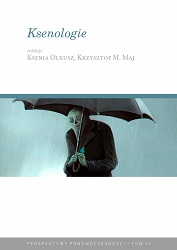Przeciw powadze
Against Gravity
Paul Karl Feyerabend's Strategy and Autobiography
Author(s): Artur Hellich
Subject(s): Philosophy, Ethics / Practical Philosophy, Political Philosophy, Social Philosophy, Pragmatism
Published by: Ośrodek Badawczy Facta Ficta
Keywords: autobiography;pastiche;parody;irony;absolutism;science;positivism;exclusion;relativism;pluralism
Summary/Abstract: In the chapter Against gravity. Paul Karl Feyerabend's strategy and autobiography Artur Hellich presents a profile of the Austrian-American philosopher and describes his academic and writing strategy. The first part of the chapter is devoted to Feyerabend’s ‘anything goes’ principle. Hellich points out the provocative rather than the serious nature of this formula and tries to defend its author against the allegations of irresponsible relativism. Then he proves the imitation of the rationalistic way of argumentation in Against Method was a form of pastiche of a serious scientific discourse. Hellich links Feyerabend’s strategy with the tactic of a ‘jester’ described by Leszek Kołakowski and argue that unfortunately Kołakowski the anti-absolutist did not see Feyerabend as his potential ally. Pastiche and parodistic strategy was also used by Feyerabend in his posthumously published autobiography (Killing Time, 1994). The close analysis of this work leads Hellich to present the Feyerabend's critique of the absolutistic and elitist demands of empiricist philosophy. Hellich argues that the criticism of science based on the neopositivist foundations finds expression in Feyerabend's ironic attitude towards the genre of autobiography. Feyerabend opposes a typical subject of an academic autobiography—a serious and distant scientist—to a character of the picaresque novel. At the same time, the traditional autobiographical scheme is replaced by a narrative of such picaresque. The key thesis of the chapter is that the reverse of the (so-called) Feyerabend’s methodological anarchism, aimed at criticizing and deconstructing the hegemonic demands of science, is the pastiche and parodistic performances and literary tricks, used both in Against Method (a ‘scientific’ thesis) and in the narrative autobiography. At the end of the chapter Hellich points out the ethical and political aspect of Feyerabend’s academic strategy of writing. He proves that Feyerabend became one of the icon of the left-wing revolution at the American universities in the sixties not by a mistake. The provocative performances and ironic strategies of writing were intended to shake the foundations of the monoethnical, monocultural and patriarchal institution of the university. For this reason, Paul Feyerabend’s strategy, close to the early postulates of the New Left movement, should be seen as a way of opposition to exclusionary academic policy and at the same time as a one of the possible ways to counteract its absolutist and elitist demands.
Book: Ksenologie
- Page Range: 127-147
- Page Count: 22
- Publication Year: 2018
- Language: Polish
- Content File-PDF

